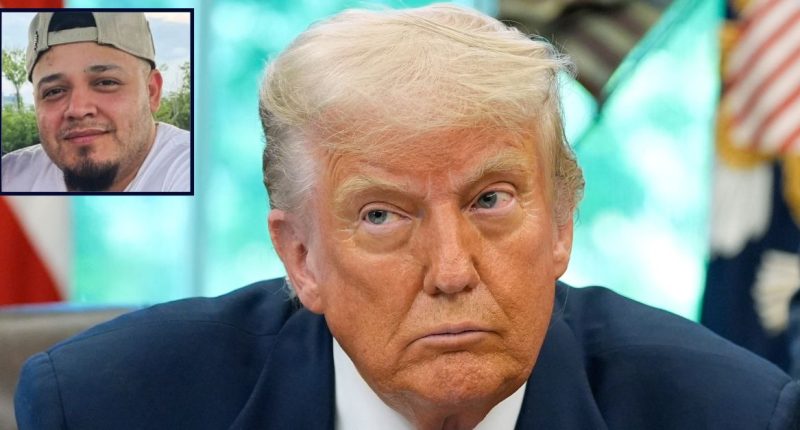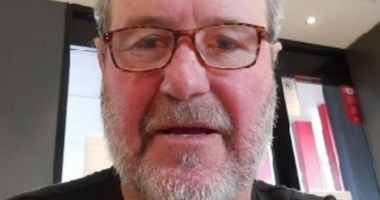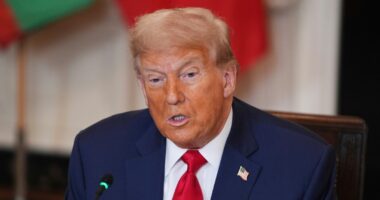Share this @internewscast.com
Main: President Donald Trump addresses reporters as he signs executive orders and proclamations in the Oval Office of the White House on Monday, May 5, 2025, in Washington (AP Photo/Alex Brandon). Inset: Kilmar Abrego Garcia in an updated photo (CASA).
During a previously confidential hearing in the Kilmar Abrego Garcia case, an attorney from the U.S. Department of Justice offered a blend of praise and critique regarding President Donald Trump’s communication abilities.
The transcript from this hearing was recently made available in a redacted and limited format by U.S. District Judge Paula Xinis, who was appointed by Barack Obama. This release followed a motion filed by several news organizations seeking to unseal various documents related to the case.
While the transcript is not yet available on the public court docket, The New York Times’ Alan Feuer obtained a copy of the document and posted a notable snippet of an exchange between the judge and DOJ attorney Jonathan Guynn in a post on X (formerly Twitter).
“President Trump is you know, is a master messenger in many ways, but he also doesn’t speak with precision about things sometimes,” the government lawyer said. “And I think that this might be one of those situations where perhaps his comments were based on what he was recalling may have been the state of play previously.”
Love true crime? Sign up for our newsletter, The Law&Crime Docket, to get the latest real-life crime stories delivered right to your inbox.
The DOJ lawyer’s remarks came amid a discussion about the 45th and 47th president’s ability to have Abrego Garcia brought back stateside.
Until the Maryland man was abruptly returned earlier this month, the official position of the government was that the U.S. simply no longer had control of the situation. Attorney after attorney, in courtroom after courtroom, insisted the decision rested with officials in El Salvador.
Xinis appeared suspicious of this claim, based on an April 29 interview of Trump by since-fired ABC News anchor Terry Moran. During that interview, Trump said he “could” just pick up the phone and have the Salvadoran president return Abrego Garcia to the U.S. But, Trump added, “we have lawyers that don’t want to do this.”
The hearing was the very next day — and part of Guynn’s job was cleaning up Trump’s statement, which flatly contradicted the DOJ’s position.
Xinis was not, however, the only judge to be struck by Trump’s admission about Abrego Garcia during the ABC News interview.
During a May 7 hearing in the initial Alien Enemies Act case before U.S. District Judge James Boasberg, a jurist who got his start under George W. Bush and was then promoted by Barack Obama, the president’s words were put directly to DOJ attorney Abhishek Kambli.
“Is the president not telling the truth, or could he secure the release of Mr. Abrego Garcia?” Boasberg asked the government lawyer.
The DOJ attorney tried to sidestep the question by launching into a broader argument about the government’s case. But he was quickly brought back on track by Boasberg, who interjected to say he wanted his questions answered first.
“That goes toward the president’s belief about the influence that he has,” Kambli offered.
In mid-May, Abrego Garcia’s lawyers cited the ABC News interview as well, in a bid to disrupt the regime of secrecy in the case and force the Trump administration to provide certain discovery.
While the underlying litigation has resulted in something of a fait accompli, Abrego Garcia’s lawyers are currently pushing for harsh sanctions against the government for its “vocal and sustained and flagrant” violations of court orders related to “defiance” regarding his return and discovery, “in particular.” Throughout the pendency of the litigation before Xinis, the Trump administration was under a standing order to provide daily updates about Abrego Garcia. The government was often chastised by the court — and criticized by the plaintiffs and others — for the apparently lacking nature of those submissions.
Abrego Garcia’s case has garnered international attention, quickly becoming one of the most high-profile and combative lawsuits amid the blizzard of legal challenges filed against Trump and his administration since he retook office in January. The government has conceded in numerous filings that Abrego Garcia’s removal to El Salvador was an “administrative error,” but has steadfastly insisted that he is a member of MS-13 and refused to cooperate with multiple court orders demanding that he be brought back to the country.
Earlier this month, Abrego Garcia was returned — but remains in detention — to face human trafficking charges in Tennessee.
















